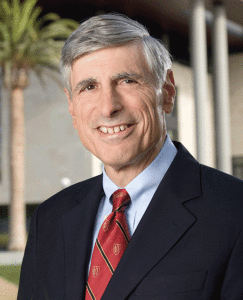How Higher Education Can Aid Life Transitions
Colleges can help midlifers reinvent and redirect themselves
(This article is the 18th in a weekly Next Avenue series, The Future of Aging: Realizing the Potential of Longevity, published by the Milken Institute Center for the Future of Aging. Links to the rest of the series appear at the end of this article.)
Technology will continue to change our lives in amazing ways, influencing our access to knowledge, how we monitor and improve our well-being and how we communicate and create a social connectedness that transcends boundaries and borders. However, despite the emergence of increasingly sophisticated ways to connect people with people, information technology has not replaced forming a community in deeply personal ways.

For example, just a few short years ago, the conventional wisdom was that new technologies would replace the need to travel to meetings, attend conferences or even go to school. It would be cheaper and faster to have everything available at our fingertips — when we wanted it, regardless of where the need or interest arose.
To a remarkable degree, this has happened. We almost take for granted how easy it is to answer a question, probe a topic, connect with a friend or colleague or monitor the metrics of physical activities.
The Desire for Connection
And we do it exuberantly. A recent survey at Baylor University suggests that students spend up to 10 hours a day on various devices. But despite dramatic changes in social networking, we still want to connect personally, go to school together or have contact with our caregivers.
For example, for those transitioning from adolescence to adulthood and have the opportunity, there is still a strong desire to attend college, live residentially and create linkages to communities that will guide their intellectual, social, moral and physical development. A “college experience” is more than acquiring knowledge — it’s a social exploration with peers and teachers that helps to shape life’s direction(s).
A college education is also an important predictor of income and life expectancy. But increasing the lifespan also poses challenges.
Contributing After Age 65
While the impact of early education can be lifelong, satisfaction in most jobs wanes over the years. In some career pathways, it is extinguished by the fourth or fifth decade of life. Traditionally, that has led many to simply hang on to their job and limp or coast toward retirement in the sixth decade of life. But that norm is becoming increasingly antiquated.
During the past century, life expectancy has increased 30 years in the United States. By 2030, some 20 percent of the population will be over 65 years of age. Although a number of these individuals aspire to “retirement,” many others would prefer to continue contributing, working or volunteering in activities that provide meaning and value and foster connections and community building.
Can Universities Help Midlife Navigation?
Although some individuals can make this transition on their own, many would benefit from resources or programs to help guide them to the next steps in the life journey. Since education played a key role in launching the first phase of that journey, an important question is whether universities can and should play a role in helping individuals navigate midlife.
Universities, colleges and community colleges have the opportunity to create programs for people in midlife who seek personal transformation, reinvention and redirection. There are many approaches to pursue — from continuing education and online programming to career assistance and planning activities. While each approach can have value, it is important to ask how much programs need to engage the fundamental elements of the “college experience” that create community and purpose — and ideally also foster physical and emotional development.
Fostering Paths for Learning and Sharing
In addition to transforming midlife for individuals, novel programs in midlife education could have a transformative impact on higher education by fostering informal and formal paths for intergenerational learning, teaching and sharing. This has implications for impact on individuals, universities and society — and the overall life journey from a broad social, economic and health perspective.
Based on the experience of pilot programs at Harvard and Stanford, along with exploratory programs at Pace University, Wagner College, the University of Connecticut, Arizona State University and others, it is becoming clear that these institutional experiments have value.
These programs suggest that higher education should seek ways to embrace and foster opportunities for midlife renewal that serve the needs of individuals, their communities and alumni, as well as our nation and the world.
The first article in this series was A New Model for the Future of Aging. The second was Personalized Aging: Extending Lifespans and Healthspans. The third was Boomers: Less Tied to Friends and Family Than Others Are. The fourth was What It Will Take for the U.S. to Profit From the Longevity Dividend. The fifth was Work, Retirement and Financial Security in the 21st Century. The sixth was Technology, Aging and the Coming Fifth Wave. The seventh was 5 Course Corrections Needed for a Better Future of Aging. The eighth was Let’s Make the Most of the Intergenerational Opportunity. The ninth was How We Can Use Our Longer Lives to Do Good. The 10 was Building Cityscapes for Healthy Aging. The 11th was Aging in the 'Right' Place. The 12 was How to Make Longer Working Lives Work. The 13 was Four Freedoms That Will Define the Future of Aging. The 14 was The Future of Healthy Aging… Is Yesterday. The 15 was You’re Going to Get Old, So Think About It Now. The 16 was Does Purpose Only Benefit the Young? The 17 was How to Help Achieve Optimal Health for the Elderly.

